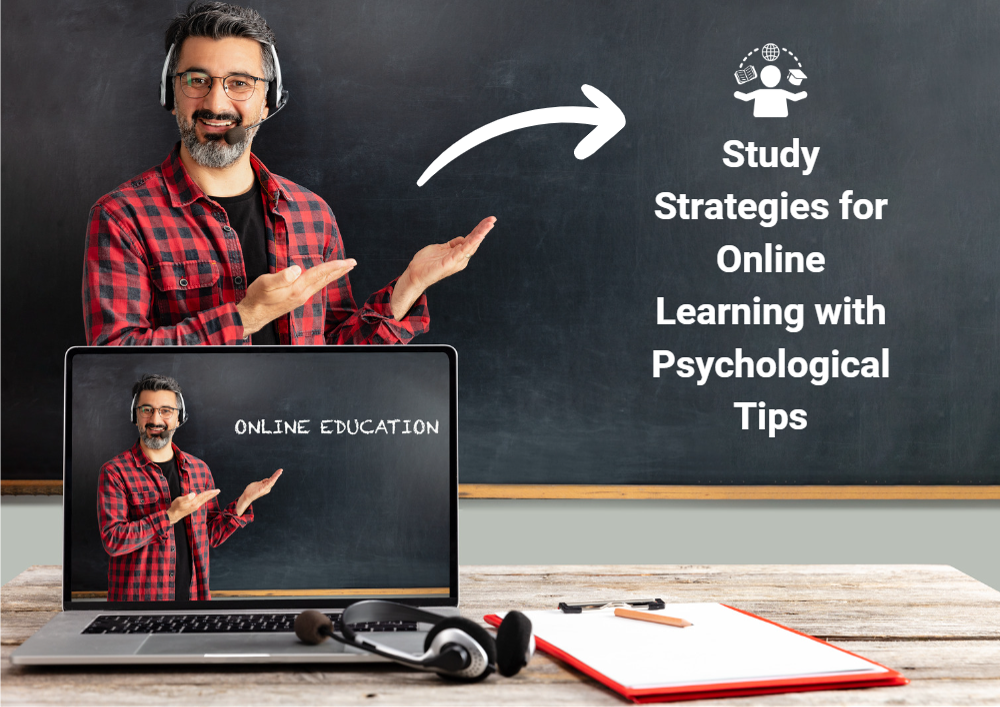In recent years, the advent of Online Learning has revolutionized the way people access education. With the flexibility and convenience it offers, online learning has become a popular choice for students and professionals alike. However, to make the most of this virtual learning environment, it is essential to adopt effective study strategies specifically tailored to the online setting. In this comprehensive guide, we will delve into various study strategies and psychological tips that can help to optimize your online learning.
Understanding Online Learning
Before we dive into the study strategies, let’s first understand the nature of online learning. Online learning involves the delivery of educational content and resources through digital platforms, enabling learners to access course materials, participate in discussions, and complete assignments remotely. It offers flexibility in terms of time and location, allowing individuals to pursue their educational goals at their own pace.
Benefits of Online Learning 
Online learning brings several advantages that contribute to its growing popularity. Some key benefits include:
- Flexibility: Online learning provides the flexibility to study at your own pace, allowing you to balance education with work, family, or other commitments.
- Access to Diverse Courses: Online platforms offer a wide range of courses across various disciplines, giving learners the opportunity to explore diverse subjects of interest.
- Convenience: With online learning, there’s no need to commute or adhere to rigid class schedules. You can access course materials and engage in learning activities at a time and place that suits you.
- Enhanced Technological Skills: Online learning exposes you to various digital tools and platforms, improving your technological competence, which is crucial in today’s digital world.
- Global Learning Community: Online learning connects you with a global community of learners, allowing for diverse perspectives and cross-cultural interactions.
Challenges of Online Learning
While online learning offers numerous benefits, it also presents unique challenges that learners need to overcome. Some common challenges include:
- Self-Motivation and Discipline: Online learning requires self-motivation and discipline to stay on track with coursework and meet deadlines without the structure provided by traditional classroom settings.
- Lack of Face-to-Face Interaction: Unlike in-person classes, online learning can be isolating as it lacks face-to-face interaction with instructors and peers (for further reading). This requires proactive engagement to foster connections and actively participate in virtual discussions.
- Effective Time Management: Managing time effectively is crucial in online learning, as the flexible nature of the format can make it tempting to procrastinate or struggle with prioritization.
- Technological Challenges: Technical issues such as internet connectivity problems or software glitches can disrupt the learning experience. Developing troubleshooting skills and having alternative plans in place is essential to overcome these challenges.
- Potential for Distractions: Learning from home or other non-traditional environments introduces potential distractions that can hinder focus and productivity. Creating a conducive study environment is crucial to minimize distractions.
Study Strategies for Online Learning
Setting Goals and Creating a Schedule:
One of the fundamental aspects of successful online learning is setting clear goals and creating a schedule. Setting goals provides direction and purpose, helping you stay focused and motivated throughout your online learning journey. When setting goals, consider the following tips:
- Set specific, measurable, achievable, relevant, and time-bound (SMART) goals.
- Break down larger goals into smaller, manageable tasks.
- Prioritize tasks based on importance and urgency.
- Utilize online tools, such as calendars or task management apps, to schedule study sessions and track progress.
- Regularly evaluate and adjust your goals as needed.
Managing Time Effectively:
Effective time management is crucial for online learners, as it allows you to allocate sufficient time for studying, completing assignments, and engaging in other activities. Consider the following strategies to manage your time effectively:
- Create a weekly or monthly study schedule that outlines dedicated time slots for each subject or course.
- Identify your most productive times of the day and schedule demanding tasks accordingly.
- Break down larger tasks into smaller, more manageable segments to avoid feeling overwhelmed.
- Use time management techniques, such as the Pomodoro Technique, to enhance focus and productivity.
- Minimize distractions by silencing notifications, finding a quiet study space, and using website blockers if necessary.
Creating a Productive Study Environment:
Creating a productive study environment is crucial for concentration and focus during online learning. Consider the following tips to optimize your study space:
- Find a quiet and well-lit area in your home or a location where you can concentrate without distractions.
- Ensure you have a comfortable chair, desk, and proper lighting to prevent physical discomfort.
- Keep your study area organized and clutter-free to minimize visual distractions.
- Customize your study environment with personal touches that inspire and motivate you.
- Use noise-canceling headphones or play soft background music if it helps you focus.
Overcoming Procrastination :
Procrastination can be a significant hurdle in online learning. Combat this challenge by implementing strategies that promote productivity and reduce procrastination:
- Break down tasks into smaller, more manageable parts to make them feel less overwhelming.
- Set specific deadlines for each task to create a sense of urgency and accountability.
- Utilize productivity techniques, such as the “two-minute rule” or “eat the frog,” to tackle challenging tasks first.
- Use productivity apps or browser extensions that block distracting websites or limit your time on them.
- Seek an accountability partner or join virtual study groups to support each other and stay motivated.
Building Effective Study Habits:
Developing effective study habits is essential for retaining information, understanding concepts, and performing well in online courses. Consider incorporating the following study strategies into your routine:
- Active Learning: Engage actively with the course material by taking notes, summarizing key points, and asking questions.
- Regular Review: Review your notes and course materials regularly to reinforce learning and identify areas that need further clarification.
- Self-Testing: Quiz yourself or create flashcards to assess your understanding and memory of the material.
- Concept Mapping: Create visual representations, such as mind maps or diagrams, to connect and organize ideas.
- Teaching Others: Explain concepts or teach the material to someone else to solidify your understanding and identify any gaps in your knowledge.
Active Learning Techniques:
Engaging in active learning techniques can significantly enhance your online learning experience. Active learning involves actively participating in the learning process rather than passively consuming information. Consider the following techniques:
- Participate actively in online discussions or forums by asking questions, sharing your insights, and responding to others’ posts.
- Seek clarification from instructors or classmates when you encounter challenging concepts or need additional explanations.
- Apply course concepts through practical exercises, simulations, or real-world applications to reinforce understanding.
- Collaborate with peers on group projects or assignments to benefit from diverse perspectives and shared learning experiences.
- Reflect on your learning by journaling or discussing how the course material relates to your personal or professional life.
Effective Note-Taking Strategies:
Note-taking is an essential skill that can enhance your comprehension and retention of course material. Consider these effective note-taking strategies for online learning:
- Summarize and Paraphrase: Rather than transcribing everything, focus on capturing key ideas, main points, and supporting examples in your own words.
- Use Visual Aids: Incorporate diagrams, charts, or mind maps to visually represent relationships between concepts or to illustrate complex ideas.
- Organize Information: Create headings, subheadings, or bullet points to structure your notes and make them easier to review later.
- Color Coding: Use different colors or highlighters to categorize information, emphasize important details, or identify keywords.
- Combine Notes with Course Materials: Supplement your notes with additional readings, lecture slides, or multimedia resources provided by the course.
Leveraging Technology for Learning:
In the digital age, technological tools and resources are readily available to enhance your online learning experience. Consider the following ways to leverage technology effectively:
- Utilize educational apps and online platforms that provide interactive content, practice exercises, or quizzes related to your courses.
- Access online libraries, databases, or academic journals to broaden your research and find additional resources for assignments or projects.
- Use productivity apps or study tools to manage tasks, create study reminders, or collaborate with peers.
- Explore virtual reality (VR) or augmented reality (AR) applications that can simulate real-world scenarios or provide immersive learning experiences.
- Engage with social media platforms or online communities related to your field of study to stay updated and connect with professionals or like-minded learners.
Collaborative Learning Strategies:
Collaborative learning can enrich your online learning experience by fostering peer interaction, knowledge sharing, and the exploration of diverse perspectives. Consider the following strategies for effective collaboration:
- Participate actively in online discussion boards, forums, or group chats to engage in meaningful conversations with classmates.
- Organize virtual study groups or study sessions to discuss course material, share study resources, and clarify doubts.
- Collaborate on group projects or assignments, dividing tasks and leveraging each member’s strengths.
- Provide constructive feedback to peers and learn from their perspectives, promoting a supportive and inclusive learning environment.
- Engage in peer review activities to enhance critical thinking and receive feedback on your own work.
Managing Online Distractions:
Online learning environments can be prone to distractions, which can impact your focus and productivity. Implement the following strategies to manage online distractions effectively:
- Limit Social Media Usage: Use browser extensions or apps that limit your access to social media platforms or set specific time intervals for browsing.
- Turn Off Notifications: Disable non-essential notifications on your devices to minimize interruptions during study sessions.
- Create Internet-Free Zones: Designate certain periods or areas where you disconnect from the Internet to avoid distractions.
- Use Website Blockers: Install browser extensions that block specific websites or limit your time spent on them during study hours.
- Practice Mindfulness Techniques: Incorporate mindfulness exercises, such as deep breathing or meditation, to improve focus and reduce distractions.
Enhancing Concentration and Focus:
Maintaining concentration and focus is crucial for effective online learning. Implement the following techniques to enhance your ability to concentrate:
- Eliminate External Distractions: Find a quiet and dedicated study space, free from noise, interruptions, and visual distractions.
- Use Noise-Canceling Headphones: Block out ambient noise by using noise-canceling headphones or playing instrumental music to create a focused environment.
- Break Down Study Sessions: Divide your study sessions into shorter, focused blocks of time, with short breaks in between, to maintain mental freshness and prevent fatigue.
- Practice Mindfulness: Engage in mindfulness exercises, such as deep breathing or guided meditation, to cultivate present-moment awareness and improve concentration.
- Employ the “Pomodoro Technique”: Set a timer for 25 minutes of focused work, followed by a 5-minute break. Repeat this cycle several times, and take a more extended break after a few cycles.
Dealing with Online Assessments and Exams:
Online assessments and exams require specific strategies to ensure preparedness and success. Consider the following tips to navigate online assessments effectively:
- Review Course Material: Thoroughly review the course content, notes, and supplementary resources to reinforce your understanding of the subject matter.
- Practice with Mock Exams: Take advantage of any practice exams or sample questions provided by the course to familiarize yourself with the format and assess your knowledge.
- Manage Time Effectively: Read instructions carefully, allocate time for each question or section, and pace yourself throughout the assessment to complete it within the allocated timeframe.
- Minimize Distractions: Choose a quiet environment free from distractions, turn off notifications on your devices, and close unnecessary tabs or applications.
- Test-Taking Strategies: Read each question carefully, underline keywords, and consider using the process of elimination to arrive at the best possible answer.
- Backup Internet Connectivity: If possible, have a backup internet connection or data plan in case of any connectivity issues during the assessment.
Seeking Help and Support:
Seeking help and support is essential in online learning, as it can provide clarification, guidance, and motivation. Consider the following avenues for assistance:
- Instructor Communication: Establish regular communication channels with your instructors, such as email or virtual office hours, to seek clarification on course content or address any concerns.
- Online Discussion Forums: Participate actively in online discussion forums or virtual study groups, where you can ask questions, share insights, and receive peer support.
- Online Tutorials or Help Resources: Explore online tutorials, guides, or help resources provided by the course platform or institution to address common technical issues or learn how to navigate the learning management system.
- Peer Collaboration: Collaborate with classmates on group projects, assignments, or study sessions, leveraging each other’s strengths and supporting one another.
- Academic Support Services: Reach out to academic support services offered by your institution, such as tutoring services or writing centers, for additional assistance or guidance.
Effective Psychological Tips for Online Learning
In addition, to studying strategies, incorporating effective psychological tips can further enhance your online learning experience. Consider the following psychological tips:
- Positive Self-Talk: Cultivate a positive mindset by replacing negative thoughts or self-doubt with positive affirmations and encouraging self-talk.
- Visualizations and Imagery: Use visualization techniques to mentally picture yourself succeeding in your online learning endeavors and achieving your goals.
- Goal Setting: Set specific, achievable goals and track your progress to stay motivated and maintain a sense of accomplishment.
- Self-Care Practices: Prioritize self-care activities, such as exercise, proper nutrition, adequate sleep, and relaxation techniques, to support your overall well-being and mental health.
- Break Tasks into Manageable Chunks: Divide larger tasks into smaller, more manageable chunks to prevent feeling overwhelmed and maintain a sense of progress.
- Reward System: Establish a reward system for accomplishing milestones or completing challenging tasks to incentivize and reinforce your efforts.
Conclusion
Online learning offers flexibility, convenience, and a wide range of educational opportunities. By implementing effective study strategies, managing time wisely, creating a productive study environment, and incorporating psychological tips, you can optimize your online learning experience and achieve academic success. Remember to stay motivated, seek support when needed, and embrace the transformative power of online education.

